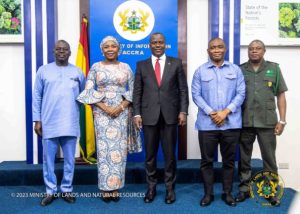
Source: myjoyonline.com
The Minister for Lands and Natural Resources, Samuel A. Jinapor, MP, says the Ministry and the Forestry Commission have put in place adequate measures to protect the forest resources of the country, while working to increase the nation’s forest estate.
This was disclosed at a press briefing held at the Ministry of Information to provide an update on the state of Ghana’s Forest Reserves.
Ghana has some estimated 6.6 million hectares of forest, made up of 1.2 million hectares of closed forest and 5.4 million hectares of open forest. These have, however, come under threat, largely, from activities such as illegal mining and illegal logging.
Speaking on Tuesday, 2nd May, 2023, the Minister said the fight against deforestation and forest degradation is a process and not an event.
He said deforestation and forest degradation are not new phenomena, the country having lost some eighty percent (80%) of our forest since 1900.
According to Mr. Jinapor, the rate of deforestation peaked in 2014, with over thirty-five thousand (35,000) of forest lost in that year alone.
He however assured that Government has put in place adequate measures to curb the menace.
“What is important is the commitment to protect and preserve these resources, which we are fully determined to do,” the Minister said.

He mentioned initiatives such as the suspension of exploration in forest reserves, and the ban on the harvesting of Rosewood and the issuance CITES permits as some of the measures being implemented protect the existing forests; while the Green Ghana Project, the Forest Plantation Strategy, the Youth in Afforestation Programme, the Youth in Plantation Establishment as an Occupation Programme, and other programmes seek to increase the forest estate of the country.
Mr. Jinapor added that Cabinet has directed the National Security Coordinating Committee, chaired by the Minister for National Security, Albert Kan Dapaah, to work with the Forestry Commission to flush out all persons involved in illegal operations in forest reserves.

Chief Executive Officer Forestry Commission, Mr. John Allotey
In his presentation on the state of the nation’s forests, the Chief Executive Officer of the Forestry Commission, Mr. John Allotey, said the key drivers of deforestation and forest degradation are agricultural expansion, illegal logging, illegal mining, wildfires, overgrazing and infrastructural development.
He mentioned the Apamprama, Oda River and Subin Shelterbelt Forest Reserves as some of the most impacted reserves by activities of illegal miners and loggers.
To contain the situation, the Chief Executive Officer said the Forestry Commission has adopted several law enforcement measures, including the training of 964 Field Officers, the procurement of 1000 pump action guns, the inauguration of Rapid Response Teams and the training of Forest Managers to prosecute forest offences.
He said through these measures, several equipment, including excavators and chainsaw machines, have been seized and demobilised in forest reserves. He said the Commission is also using technology to trace timber from the forest till final disposal to ensure that only wood legally sourced is allowed on the market.
On measures being adopted to increase the country’s forest estate, Mr. Allotey said under the Ghana Forest Plantation Strategy alone, some 690,436 hectares of forest was cultivated between 2017 and 2022. He said the Commission has, also, intensified its reclamation efforts, through the Forest Investment Programme and the Ghana Landscape Restoration and Small Scale Mining Project (GLRSSMP), to reclaimed degraded forests.
He called on all stakeholders, including traditional authorities and civil society organisations, to support the Commission to protect the country’s forest Reserves.
Source: www.myjoyonline.com








